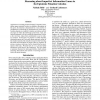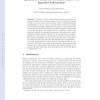1632 search results - page 131 / 327 » Modeling billiards games |
AAAI
2010
14 years 11 months ago
2010
Approaches to reasoning about knowledge in imperfect information games typically involve an exhaustive description of the game, the dynamics characterized by a tree and the incomp...
CORR
2004
Springer
14 years 10 months ago
2004
Springer
A growing body of literature in networked systems research relies on game theory and mechanism design to model and address the potential lack of cooperation between self-intereste...
108
click to vote
ATAL
2011
Springer
13 years 10 months ago
2011
Springer
The field of multiagent decision making is extending its tools from classical game theory by embracing reinforcement learning, statistical analysis, and opponent modeling. For ex...
ICALP
2009
Springer
15 years 4 months ago
2009
Springer
Abstract. We study a model of games that combines concurrency, imperfect information and stochastic aspects. Those are finite states games in which, at each round, the two players...
104
click to vote
LCN
2007
IEEE
15 years 4 months ago
2007
IEEE
Abstract—We introduce a game-theoretic framework for reasoning about bandwidth attacks, a common form of distributed denial of service (DDoS) attacks. In particular, our traffic...


